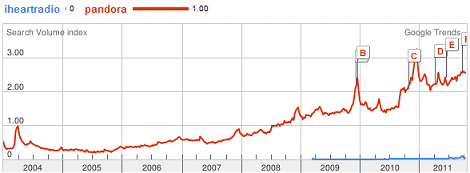 Analytics, Metrics and Music for the Radio Industry
Analytics, Metrics and Music for the Radio Industry
 An Indie Artist Pipeline to Internet Radio
An Indie Artist Pipeline to Internet Radio
 Radio Industry ROI Strategy
Radio Industry ROI Strategy
 A New Breed of Indie Artists
A New Breed of Indie Artists
Saving Money the Radio Industry Way
How much money do you think the top 25 people on Clear Channel's payroll cost the company annually? I don't have an answer, but will guess that it is above the amount of those who have lost (or will lose) their jobs in the current Clear Channel downsizing.
While expenses are on my mind, what do you think was the degree of radio industry over-payments made when Clear Channel went on its buying spree (1998-2004)?
| "There is no 'new' left in the radio industry - nothing that is born out of the passion a radio visionary has in melding radio with new media." |
Offers for stations got ridiculous, prompting me to write these words in June 2002 (under the headline "Buying at Multiples of 40+"):
|
There's a dollars-and-cents approach to radio that's winning over a common sense approach.
Today's Radio Ink headline of Clear Channel: "We Are Not Cutting Costs," positioned as a quote by leader John Hogan, is tragic humor. Now we must endure his new refrain: "It leverages Clear Channel Radio’s resources to serve our local listeners, advertisers and communities better —the content our listeners hear from our company’s best programmers and top on-air talent will be more localized -- including traffic, weather, community events and local news — and the overall quality will increase."
This comes from the man who gave us "Less is More," from a person who (to my knowledge) has never produced a radio program, from the president of radio's largest company whose founding CEO publicly stated: "We're not in the business of providing news and information. We're not in the business of providing well-researched music. We're simply in the business of selling our customers' products."
What is broadly perceived as decreased local programming has slowly dismantled a once great industry, and the frightening thought is "it's not through." Anyone who's ever created anything knows that workload has a direct effect on quality of product. (Not mentioned: HD Radio channels needing content, and streams that must stop being rebroadcasts of over-the-air programming.)
We're not just talking about consumed "content," but also the ancillary services that content needed to sell and market programming to audience and advertisers.
I'm all for profit. Where folks like John Hogan and I disagree is in how much revenue should end up as "profit," and what measures should be taken to achieve a profit target.
We cannot do anything about years wasted backing HD Radio. As for the performance royalty fees that will eventually end up in broadcasters' budgets, all that can be done is prepare - and ask NAB President and CEO Gordon Smith about his "Yet, we succeeded in stopping this bill from passing...." comment made just weeks ago.
There is a deep chasm between what the radio industry is doing and what is being done by media which is being embraced by the public more firmly each day. On radio's side, expenses are being cut, R&D doesn't exist, "chances" are never taken, and new talent are not given freedom to be heard.
There is no "new" left in the radio industry - nothing that is born out of the passion a radio visionary has in melding radio with new media. I'm not asking for a Steve Jobs, or even a Walt Disney, though someone with the creative (and demanding) flare of SNL's Lorne Michaels would work.
To those who say "Pittman and iHeartRadio," let's keep this in perspective with a Google Trends graph. Blue is an attempt at copying red, nothing more.

The feeling that nothing could derail something which had so much speed, and was so well-respected by local audiences, caused radio to waste time. Hubris that new media would not amount to competition (thus radio executives didn't need to understand it) was misplaced, as hubris always is. And radio's refusal to support webcasters in their fight against performance royalties is coming back to bite.
Radio has changed. Those who are still employed do their jobs much differently than in years past. It's now a fight to stay relevant, which can be won - just not down the road radio's on. Clear Channel's "New National Programming Platforms Team" won't even save it.
I ask radio leaders to not dishonor this industry farther by claiming "...overall quality will increase." Displaced radio employees are not stupid, or gullible. As digital hits the dashboard, you'll find neither are members of the audience (or advertisers).
To position this downsizing as an "improvement" challenges belief.










